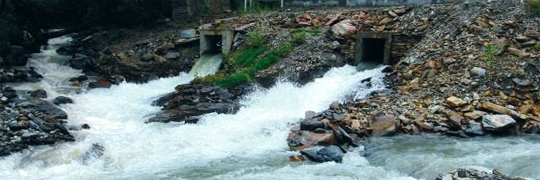When markets do work
Some innovations change lives. A favourite of mine is the village milk collection system, a cooperative model. There s a dairy in the village, people bring in milk, the dairy in
Some innovations change lives. A favourite of mine is the village milk collection system, a cooperative model. There s a dairy in the village, people bring in milk, the dairy in
A journalist recently called me to check if I thought that India had the same food consumer product record as China. He wanted to know if we face the problems that are plaguing Chinese exports of
By Devinder Sharma Union Finance Minister P Chidambaram should address the woes of those ailing farmers in the budget. General elections are around the corner. It is therefore more of a political compulsion than the requirements of a prudent fiscal policy that should have automatically diverted public funds for the ailing agrarian sector. Unfortunately, the game plan all these years has been to ignore agriculture and instead pamper the bloated rich of big business to grow richer. No budget is complete without the Finance Minister reminding the country, with possibly a catchy phrase thrown-in, the Herculean task his budget will perform in addressing the agrarian crisis. P Chidambaram is no exception. He often quotes a couplet from the writings of some of the best-known poets, saints and thinkers of south India. After all, 60 per cent of the population is still directly engaged in farming. Despite all these efforts to rescue agriculture, the annual budget has truly been a carnival for the rich and beautiful. As the veteran economist Kamal Nayan Kabra reminds us: "Indeed, the corporate income tax foregone by the government is trivially less than the total amount spent by both the central government and the 28 state governments on all rural development schemes.' Accordingly, in 2004-05 Rs 2.06 lakh crore was the revenue loss from the numerous tax concessions, exemptions and incentives, the total excise, customs and personal income tax and corporate income tax exemptions. In 2005-06, these exemptions amounted to Rs 2.35 lakh crore. For the debt-ridden farmers, and despite reports of farmers suicides regularly pouring in from various parts of the country, the Finance Minister will gloat while announcing that he has managed to meet the target of providing Rs 2.25 lakh crore as farm credit in 2007-08. Ironically, this is less than the total revenue loss of Rs 2.35 lakh crore incurred a year earlier from tax exemptions for India Inc. Isn't it therefore strange economics? What millions of farmers get is simple gratitude (and credit), whereas a few hundred rich walk away with almost an equal amount as direct income (money saved by way of tax exemptions is like money earned). Why can't the industries be asked to avail more credit, and let the direct income be for the farmers? I have often wondered as to how does the economist justify more credit to farmers who are already reeling under the burden of non-repayment of credit. Well, everyone knows that farmers are committing suicide because they cannot repay back the loans. Mounting indebtedness is the reason behind the death toll on the farm. Why can't the Finance Minister make an honest effort to pull these farmers from the credit trap? Why can't the Finance Minister actually provide farmers with more steady and assured monthly income? After all, like all of us what the farmers too need is a monthly take-home income package. The first step that needs to be taken is to write-off the outstanding dues of small and marginal farmers owning less than 5 acres of land in irrigated areas and 20 acres in un-irrigated regions. There is already a talk of writing-off Rs 65,000-crore, including Rs 25,000-crore, which the nationalised banks fear would be the non-performing asset. The accumulating losses that the farm sector has been incurring year after year are much higher than this amount. Such bad debts need to be immediately struck off so as to provide a new lease of life to the debt-ridden farmer. In fact, the UPA government should have done this soon after it came into power in May 2004. At the same time, lowering the interest rate for farm loans to 4 per cent across board is also required. In China, the interest rate for credit to small farmers has been abolished. Along with this, what is more important and does not require any fiscal outlay is the need to abolish the draconian law that was enacted during the British Raj. Between 1904 and 1912, the British had framed Public Demand Recovery Act, under which farmers could be jailed for defaulting the State for a paltry sum. So much so that even the jail expenses were to be borne by the farmers. The banks have very cleverly used the same provisions for debt recovery in agriculture. Striking out the bad debt needs to be accompanied by a new farm policy that guarantees against making this a recurring exercise. Unless the government ensures that the National Food Security Mission and the Rs 25,000-crore fund it has set aside for agriculture as per the recommendation of the National Development Council are diverted to a nationwide Low External Input Sustainable Agriculture (LEISA) programme, the cycle of mounting indebtedness and then writing-off loans will not end. Replacing the current system of fertiliser subsidy wherein the government reimburses the industry for production expenses can make a beginning. Fertiliser subsidy, which is expected to touch Rs 50,000-crore in the near term, should in future be provided directly to farmers. What is acting as a roadblock for implementing this recommendation is the lack of political consensus. Farmers should be encouraged to utilise this subsidy for shifting to organic means of production. Such an initiative will drastically reduce the cost of production, rejuvenate the soils, provide income to farmers and also reduce greenhouse gas emissions.
The growing relevance of India's newly-minted "trillion-dollar economy' to the changing global economic order was emphasised at a seminar here on Monday in the context of Finance Minister P. Chidambaram's 2008-2009 budget. India's High Commissioner to Singapore S. Jaishankar said China, as "a political aside' in this emerging global story, "has now overtaken the United States as India's largest trading partner.' K. Venugopal, Joint Editor of The Hindu and The Hindu Business Line, traced some "fantastic aspects of India's growth story' but cautioned that the current trends of "a miserable show' in the power sector and project slippages in the overall infrastructure domain could still "stop ... the trillion-dollar economy from cantering' at a comfortable pace. KPMG India Executive Director Girish Vanvari said the Finance Minister had opted for "cautious' projections for the future, keeping in mind the current reality that "the Indian economy is on a roll.' Setting the tone for the seminar, organised by KPMG and the Singapore Indian Chamber of Commerce & Industry in association with The Hindu Business Line, Dr. Jaishankar said: "We are now, probably for the first year, talking about the budget of a trillion-dollar economy. We are talking about a country, where there is a 150 per cent increase in the net FDI flows, where the outward investments have actually also gone up almost seven times over what it used to be in 2003-2004, where the trade-to-GDP ratio has gone up very sharply. The [latest] budget, like any other happening in India, has a certain immediate context and a longer-term context in terms of reform.' Key factors Outlining the budget proposals in the context of what Mr. Chidambaram might have had on his mind, Mr. Venugopal spelt out an array of factors that served as the political and economic background. These were the possibility of general elections within the next 14 months; farm suicides; the drop in public investment in the agricultural sector; some indices of an economic slowdown; the appreciating rupee; the surge in foreign investment inflows; the ebb and flow of the stock market trends which, in the last six months, were "not bad' compared to the U.S. and Chinese markets; "the divergent worms' in regard to trade deficit; and the political sniping at "an economy on the downswing.' He summed up the "budget response' as follows: Rs. 60,000-crore debt waiver for small and marginal farmers; tax breaks for individuals, not companies; and excise duty reduction from 16 per cent Cenvat to 14 per cent, with no sops for exporters. Posing the question whether these proposals would work, Mr. Venugopal said: "Not everyone in the political world congratulates Mr. Chidambaram for the debt waiver. [Some] say he has not done enough. Why is India's agriculture on the rocks? One reason is that irrigation projects have failed to deliver in the last decade or so. The government's Economic Survey conceded as much. The weakening farm pulse [is such that] the only thing that has grown smartly is credit supply.' On income tax, he said the Finance Minister was "like India's spinners: flight the ball more and probably you will get the batsman out.' The growth of the economy "is delivering a lot more as tax revenues for the government.' Citing some "concerns,' including rising food prices, and turning the focus on "some very bright spots' such as the telecom and aviation sectors, Mr. Venugopal said, "The agenda is [still] pretty long' for the future. In addressing it, Mr. Chidambaram might also have to reckon with the "fragility of the coalition that he is part of.' Mr. Girish Vanvari gave an expert overview of the budget matrix of direct and indirect taxes. Vishal Sharma, KPMG Singapore Executive Director, presided.
<p><strong>Copenhagen Accord: country submissions </strong><br /> <br /> By now, Australia, US, China and EU have all sent their letters to UNFCCC secretariat regarding their ‘willingness to support’ the Copenhagen Accord or not. It is interestingly to break down the communication and to read between the lines. <br /> <br />
<p>As I watched President Barack Obama speak on the BP oil spill in the Gulf of Mexico many thoughts crossed my mind. <br />
<p> </p> <p><em>It's time the green brigade joins the banker-bashing, Occupy Wall Street movement</em></p> <p>Another climate summit and another potential disappointment facing the green brigade.
<p><span style="font-size:12px;"><span style="font-family: verdana,geneva,sans-serif;">With the carbon market in doldrums, emerging economies like India will have to announce bolder schemes for a low carbon
<p><strong>What you measure determines policy</strong></p> <p>Another round of the annual climate meetings is going to take place and the most ambitious outcome will be limited negotiations on some elements,

<p><span style="font-size:14px;"><strong>Food Safety in Bhutan</strong></span></p> <p><img alt="Food Safety" src="http://www.indiaenvironmentportal.org.in/files/country/bhutan/foodsafety_hl.jpg" style="width: 530px; height: 300px; border-width: 2px; border-style: solid;" /></p> <p>Bhutan regulates public health and safety in regards to food under the Food Act of 2005.<sup class="reference" id="cite_ref-FA05_13-0"></sup> The Food Act establishes the National Food Quality and Safety Commission and the Bhutan Agriculture and Food Regulatory Authority ("BAFRA"), both of which are overseen by the Ministry of Agriculture. While the Ministry of Agriculture is singularly authorized to author regulations under the Food Act, the Minister of Agriculture may delegate authority to ministries responsible for health, trade, and customs.<sup class="reference" id="cite_ref-FA05_13-1"></sup></p>

<p>Microhydels, in which water from a river tributary or water springs is diverted into a channel and is brought down through a pressure pipe to run a generator for producing electricity, are set up in
<p>Very different global rules are needed for human wellbeing</p> <p>Averting climate change does not need emission reduction pledges, timetables and a common legal framework.</p> <p>Climate governance
<p style="line-height: 22px; font-size: 14px; margin-top: 5px; color: rgb(0, 0, 0); font-family: Arial, Helvetica, sans-serif;"><em>Fuel price reform is inevitable and necessary, but clean fuel and public
<p style="line-height: 22px; font-size: 14px; margin-top: 5px; color: rgb(0, 0, 0); font-family: Arial, Helvetica, sans-serif;"><em>Not raising diesel prices would harm economy much more'</em></p>
<p align="center"><img alt="" src="http://www.indiaenvironmentportal.org.in/media/iep/homepage/msanwal_blog.jpg" style="width: 570px; height: 111px;" /></p> <p align="center"> </p> <p align="center"><em><strong>The
<p align="center"><img alt="" src="http://www.indiaenvironmentportal.org.in/media/iep/homepage/msanwal_blog.jpg" style="width: 600px; height: 117px;" /></p> <p align="center"><em>MukulSanwal<a href="#_ftn1"

Heated exchanges marked a conference which ended abruptly to hastily patch up a lukewarm agreement

The cyber revolution is swamping the world. But what is it engendering - concept of the global village or information elitism?

A public interest petition in the Supreme Court to shift industries from the Taj Trapezium, based on a report forwarded by the National Environmental Engineering Research Institute, opens up a Pandora"s box of objections to experts" ways of tackling the

Forest protection initiatives taken by villagers, though laudable by themselves, have proved to be a bane for women